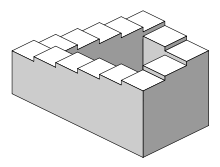FunctionCeption!
 The function
f
is defined on the set of integers and satisfies
f
(
n
)
=
{
n
−
3
f
(
f
(
n
+
5
)
)
if
n
≥
1
0
0
0
if
n
<
1
0
0
0
The function
f
is defined on the set of integers and satisfies
f
(
n
)
=
{
n
−
3
f
(
f
(
n
+
5
)
)
if
n
≥
1
0
0
0
if
n
<
1
0
0
0
Find f ( 8 4 ) .
Image Credit: Wikipedia Penrose Stairs
The answer is 997.
This section requires Javascript.
You are seeing this because something didn't load right. We suggest you, (a) try
refreshing the page, (b) enabling javascript if it is disabled on your browser and,
finally, (c)
loading the
non-javascript version of this page
. We're sorry about the hassle.
2 solutions
Nice question..did it same way -
f(84) = f(f(f(f(....f(999)))))))))) (total 184 times f) f(999) = f(1001) = 998 f(998) = f(1000) = 997 f(997) = f(999) = f(1001) = 998
And so on..
Thus for 2 'f's we get 997, so for 184 it will be the same, = 997.
Can you say how to calculate f(994) the same way without using the pattern......
Log in to reply
f(994) = f(f(999)) = f(f(f1004)) = f(f(1001)) = f(998) = f(f(1003)) = f(1000) = 997.
Good question! I finally solved it. 84 is even parity, so f (84) comes out to be 997
We start by finding values of the function right under 1 0 0 0 since they require iteration of the function.
f ( 9 9 9 ) = f ( f ( 1 0 0 4 ) ) = f ( 1 0 0 1 ) = 9 9 8 f ( 9 9 8 ) = f ( f ( 1 0 0 3 ) ) = f ( 1 0 0 0 ) = 9 9 7 f ( 9 9 7 ) = f ( f ( 1 0 0 2 ) ) = f ( 9 9 9 ) = 9 9 8 f ( 9 9 6 ) = f ( f ( 1 0 0 1 ) ) = f ( 9 9 8 ) = 9 9 7 Soon we realize the f ( k ) for integers k < 1 0 0 0 either equal 9 9 8 or 9 9 7 based on it parity. (If short on time, a guess of 9 9 8 or 9 9 7 can be taken now.) If k is even f ( k ) = 9 9 7 if k is odd f ( k ) = 9 9 8 .
8 4 has even parity, so f ( 8 4 ) = 9 9 7 .